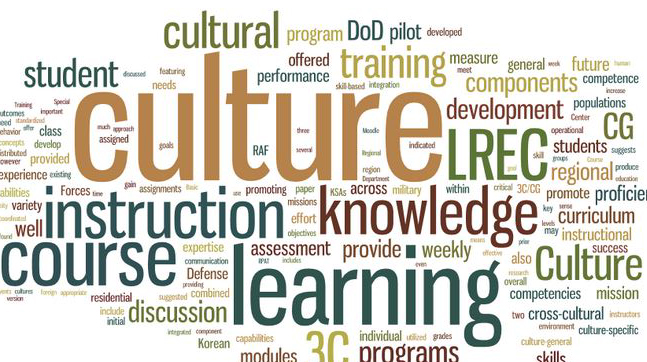Assessing the Impact Of and Needs For Navy LREC Training
Changes in worldwide strategic relationships since 9/11 and lessons learned from Operations Iraqi Freedom, Enduring Freedom, and New Dawn demonstrate the importance of Navy personnel being able to communicate in foreign languages and to comprehend foreign cultures.
The Center for Information Dominance’s Center for Language, Regional Expertise, and Culture (CLREC) plays a central role in training Department of the Navy personnel in the language skills and cultural knowledge required to effectively carry out their missions. CLREC provides predeployment cultural orientation training in a variety of forms, such as (1) group instruction facilitated by Mobile Training Teams, (2) semiautomated group presentations facilitated by a member of the command being trained, (3) individual instruction using automated and nonautomated presentations, and (4) one-on-one language tutoring for flag officers who will soon take an assignment in which linguistic training would be beneficial.
For the following reasons, CLREC wants to improve its current processes and procedures for soliciting customer feedback: to determine how well its products are being accepted, to characterize the effects of its work, and to identify whether there are unmet needs that should be addressed. CLREC turned to CNA to provide feasible options for providing feedback from customers after mission performance, instead of immediately after predeployment training (the current process).
CLREC wants these options designed to provide information about (a) whether training was applied during deployments and (b) whether the skills that were applied had a beneficial effect on mission accomplishment and minimizing liberty incidents. To develop options for CLREC, we took a four-part approach:
- Investigate how CLREC and other organizations have assessed their LREC training.
- Develop draft survey questions for a Navy CLREC assessment.
- Investigate how CLREC and other organizations have assessed their LREC training.
- Get feedback on our draft survey questions from a variety of knowledgeable individuals, including sailors serving on the 2011 Southern Partnership Station deployment.
- Recommend methods for deploying the Navy’s CLREC assessment at appropriate times and places. From our analyses, we found the following:
Assessing whether training was effective in supporting mission objectives needs to be done at a later time, not immediately after training has occurred.
Data and analyses should focus on determining needs for training rather than on providing tightly defined input-output or return- on-investment models of dollars for training and dollars of benefit. A better goal would be to provide return-onexpectations evidence showing that sailors were prepared and responded well to situations that required LREC skills.
Because of the high cost of developing tests of proficiency, selfassessments will probably need to be used as a principal indicator for assessing the results of training.
Compared with the other services, the Navy has provided training to a lower percentage of personnel, but the Navy compares favorably in terms of such important indicators as sailors’ satisfaction with LREC training and its beneficial results.
Ideally, an assessment of Navy CLREC training would include collecting survey/interview data from sailors and their officers/ unit commanders. We developed a series of survey instruments and interview guides that are tailored to assess the major CLREC products. For example, flag officers would be requested to complete a short five-item survey or interview. Various organizations could field a survey for CLREC and collect data (e.g., Defense Manpower Data Center; Navy Personnel Research, Studies, and Technology; federally funded research and development centers; and survey research organizations). CLREC could also explore with the Navy Education and Training Command whether selected instruments can be embedded in Navy Knowledge Online.
Source: Assessing the Impact of and Needs for Navy Language, Regional Expertise, and Culture Training
